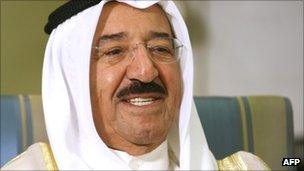Kuwait profile - Leaders
- Published
Emir: Sheikh Sabah al-Ahmed al-Jaber al-Sabah
Sheikh Sabah succeeded Sheikh Saad, who ruled for just nine days after Sheikh Jaber died on 15 January 2006 having spent more than 25 years on the throne.

Sheikh Sabah has pursued a policy of cautious reform
Parliament voted Sheikh Saad out of office because of his ill health.
Sheikh Sabah had been running Kuwait's day-to-day affairs for years. He became prime minister in 2003 when concern grew about the health of his predecessor in the post, Sheikh Saad.
He has maintain Kuwait's pro-Western stance and pursued a policy of cautious reform; his government appointed Kuwait's first woman minister and he introduced laws which opened the door to foreign investors.
The new emir moved quickly to name his brother as crown prince and his nephew as prime minister. The jobs, traditionally held by one individual, were separated in 2003.
The appointment of the crown prince also broke with the tradition of alternating power between rival branches of the Sabah dynasty.
Born in 1929, Sheikh Sabah was Kuwait's foreign minister for 40 years. Although he had a heart pacemaker fitted in 1999, he is said to be in good health.
His predecessor, the late Sheikh Jaber, suffered several years of ill health following a minor stroke in 2001. He became emir in 1977, having been prime minister from 1965-78 and heir-apparent from 1966. He survived an assassination attempt in 1985 and the 1990 Iraqi invasion.
Members of the ruling family hold most of the key cabinet posts.
Parliament has the most powers of any elected body in the Gulf, although the ruling Al Sabah family has the final word over all key decisions and has resorted to dissolving the legislature five times since 2006.